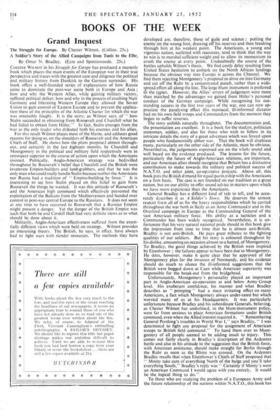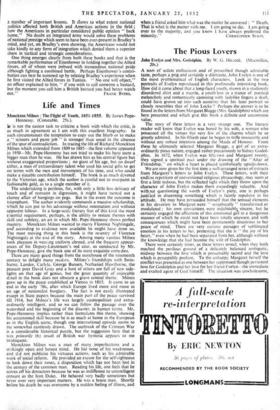BOOKS OF THE WEEK
Grand Inquest
The Struggle for Europe. By Chester Wilmot. (Collins. 25s.)
CHESTER Witmor in his Struggle for Europe has produced a masterly book which places the main events of the European war in their true Perspective and traces with the greatest care and diligence the political and military history from Dunkirk to the German surrender. His book offers a well-founded series of explanations of how Russia came to dominate the post-war scene both in Europe and Asia ; how and why the Western Allies, while gaining military victory, suffered political defeat; how and why in the process of crushing Nazi Germany and liberating Western Europe they allowed the Soviet Union to gain control of Eastern Europe and to prevent the applica- tion there of the principles of the Atlantic Charter for which the war was ostensibly fought. It is the story, as Wilmot says, of " how Stalin succeeded in obtaining from Roosevelt and Churchill what he had failed to obtain from Hitler." In fact, Stalin emerges from the 'War as the only leader who defeated both his enemies and his allies.
For this result Wilmot places most of the blame, and adduces good reasons for doing so, on the shoulders of Roosevelt and the American Chiefs of Staff. He shows how the plans proposed almost through- out, and certainly in the last eighteen months, by Churchill and Montgomery in the political and military field respectively were in retrospect superior to the course of action upon which the Americans insisted. Politically, Anglo-American strategy was bedevilled throughout by Roosevelt's belief that Churchill and the British were inveterate Empire-builders and land-grabbers, and that he was the only man who could really handle Stalin because neither the Americans nor Russia had a tradition of " Empire-building by force." It is interesting to see how Stalin played on this belief to gain from Roosevelt the things he wanted. It was this attitude of Roosevelt's and the American high command which effectively prevented the exploitation of the Balkans from the Mediterranean and handed over control in post-war central Europe to the Russians. It does not seem at any time to have occurred to Roosevelt that a Russian Empire might present a danger. Yet the danger of the British Empire was such that both he and Cordell Hull had very definite views as to what should be done about it.
Militarily, Anglo-American effectiveness suffered from the essen- tially different views which were held on strategy. Wilmot provides an interesting theory. The British, he says, in effect, have always had to fight wars with slender resources. The methods they have developed are, therefore, those of guile and science ; putting the enemy on the wrong foot, drawing off his reserves and then breaking through- him at his weakest point. The Americans, a young and vigorous nation, surfeited with resources, tend to think that the way to win is to marshal sufficient weight and to allow its momentum to crush the enemy at every point. Undoubtedly the course of the battles upholds Wilmot's thesis. We find costly delay resulting from United States hesitation to embark on the North African landings because the obvious way into Europe is across the Channel. We find them rejecting Montgomery's proposal to drive on into. Germany and cut 'off the Ruhr by a concentrated punch, rather than a wide- spread effort all along the line. The large blunt instrument is preferred to the %pier. However, the Allies' errors of judgement were more than matched by the advantages we gained from Hitler's personal conduct of the German campaign. While recognising his out- standing success in the first two years of the war, one can now ap- preciate the paralysing effect this maniacal, ill-informed dictator had on his own field troops and Commanders from the moment they began to suffer reverses.
The story unfolds naturally throughdut. The documentation and, the presentation are excellent. It is a book for the student, politician statesman, soldier, and also for those who wish to follow in its intricate details the story of a great adventure which was forced upon people who fundamentally abhor war. That the book will displease many, particularly on the other side of the Atlantic, must be obvious. Nevertheless, the judgements expressed are on the whole sound and well based on the evidence produced. The lessons for the future, particularly the future of Anglo:American relations, are important, and our American allies should recognise that Britain has a distinctive contribution to make towards the military and political success of N.A.T.O. and other joint, co-operative projects. Above all, this book puts the British demand for equal partnership with the Americans on a firm basis. The case is not founded on our tradition as a great nation, but on our ability to offer sound advice in matters upon which we have more experience than the Americans.
General Bradley has a different kind of tale to tell, and he accu- rately describes it as A Soldier's Story. He deserves the utmost respect from all of us for the heavy responsibilities which he carried throughout the war both in Sicily as an Army Commander and in the Overlord campaign in Europe as the Commanding General of the vast American military force. His ability as a tactician and a Commander has been widely recognised. Nevertheless, it is un- fortunate that his very natural national pride should in this book give the impression from time to time that he is almost anti-British. Bradley is not anti-British. He pays great tributes to the fighting qualities of our soldiers. But his story is coloured throughout by his dislike, amounting on occasion almost to a hatred, of Montgomery. To Bradley, the good things achieved by the British were inspired by Eisenhower ; the failures appear to have been due to Montgomery. He does, however, make it quite clear that he approved of the Montgomery plan for the invasion of Normandy, and his evidence should do much to silence the ill-informed suggestions that the British were bogged down at Caen while American superiority was responsible for the break-out from the bridgehead.
Unfortunately, Montgomery's personality played an important part in Anglo-American co-operation at and below Army Group level. His exuberant confidence, his manner and what Bradley describes as " primping " had a most irritating effect on many Americans, a fact which Montgomery always under-rated but which worried many of us at his Headquarters. It was particularly unfortunate because Bradley and his subordinate Generals, believing, as Chester Wilmot has underlined, in the blunt-instrument policy, were far from anxious to place American formations under British command, even when the Allied interest required it. " Remembering General Pershing's troubles in World War I," says Bradley, " I was determined to fight any proposal for the assignment of American troops to British field command." To hand them over to Mont- gomery of all people seemed to be adding insult to injury. This comes out fairly clearly in Bradley's description of the Ardennes battle and also in his attitude to the suggestion that the British force, with American assistance, should make straight for Berlin through the Ruhr as soon as the Rhine was crossed. On the Ardennes Bradley recalls that when Eisenhower's Chiefs of Staff proposed that " Monty take care of everything North of the bulge and you'll take everything South," Bradley's reply was " Certainly if Monty's were an American Command I would agree with you entirely. It would be the logical thing to do."
To those who are studying the problem of a European Army and the future relationship of the nations within N.A.T.O., this book has a number of important lessons. It shows to what extent national politics affected both British and American actions in the field ; how the Americans in particular considered public opinion " back home." No doubt an integrated army would solve these problems of national prestige which seem to have been ever-present in Bradley's mind, and yet, on Bradley's own showing, the Americans would not take kindly to any form of integration which denied them a superior
share in tactical and strategic considerations. - One thing emerges clearly from both these books and that is the remarkable performance of Eisenhower in holding together the Allied forces, all of whom were imbued with tremendous national pride although fighting a combined battle. Perhaps Eisenhower's contri- bution can best be summed up by relating Bradley's experience when he first visited the Allied forces in Tunisia. " No one will object," an officer explained to him, " if you wish to call someone a bastard, but the moment you call him a British bastard you had better watch



































 Previous page
Previous page